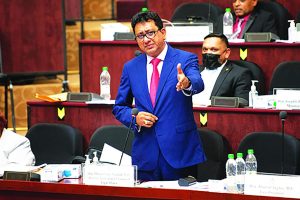… as changes are passed in the National Assembly
As the National Assembly on Monday evening passed the Powers of Attorney (Amendment Bill 2021) Act, Attorney General and Minister of Legal Affairs, Mohabir Anil Nandlall SC, relayed that the deep and far-reaching amendments would prevent miscreants from perpetrating fraud.
For context, a power of attorney, or letter of attorney, is a written authorisation to represent or act on another’s behalf in private affairs, business, or some other legal matter. T

For context, a power of attorney, or letter of attorney, is a written authorisation to represent or act on another’s behalf in private affairs, business, or some other legal matter. The person authorising the other to act is the principal, grantor, or donor.
In his presentation to the 35th sitting of the National Assembly, the Attorney General highlighted that the power of attorney in Guyana is unfortunately and often abused by the donee. To fortify his point, he noted a few cases as evidence.
How is this authority abused? The Legal Affairs Minister outlined this in two ways: one, persons forging the power of attorney document with malintent to secure, for example, property; and two, those in control of the power vested in them abusing it to secure the donor’s savings and/or other assets that they were not given privileges to access.
“Powers of attorney are given too carelessly in this country,” Minister Nandlall said. “This Bill would do the donor better. Donors’ interest will be protected. It is intended to protect society, private property, and all of us who intend to authorise someone to conduct a transaction better achieve the purposes of the Act. It seeks to stamp out fraud,” he explained.
To weed out fraud, the amendments to the Bill propose that a power of attorney would be vested only with the donor of the power and the donee of the power appearing personally together before a public notary or magistrate; and the two parties shall provide to the notary or judge two photograph identification documents that establish their identity, and a photocopy of each of the documents.
In the case when the donor is out of the country and the power is in Guyana, the two parties shall each appear personally before a public notary or magistrate in the country in which he/she is, and execute the power of attorney, providing the notary or judge with two identification documents that establish their identify, and a photocopy of each of the documents.
The Principal Act was also amended, and it speaks to the sections of offences to dishonestly obtain and use a power of attorney. It states that a person shall not dishonestly obtain a power of attorney to obtain financial advantage for himself/herself or another person, to cause loss to the principal or another person.
Like the previous offence, the Bill outlines that an attorney shall not commit the same. Importantly, an attorney who fails to comply with the requirements commits an offence, and is liable on summary conviction to five years’ imprisonment and a fine of $5 million. In the case of a corporate body, the fine shall be $10 million.
Other offences include that if any public notary who has been suspended or removed from practice, or whose name is not on the register, exercises the power of that office, an offence has been committed. In addition, a person who wilfully certifies or propounds any false statement or document, or who fraudulently, with intent to deceive, conceals, withholds, or perverts any fact or document pertinent to the subject of the power of an attorney, commits an offence.
These are just a few of the offences listed in the Bill.
“The compendium of measures will go a long way to prevent miscreants from perpetrating fraud small in size, but deep and reaching (in) ramifications. The two forms of identification were not inserted into this bill lightly. It was deliberately drafted this way,” Minister Nandlall has said.











